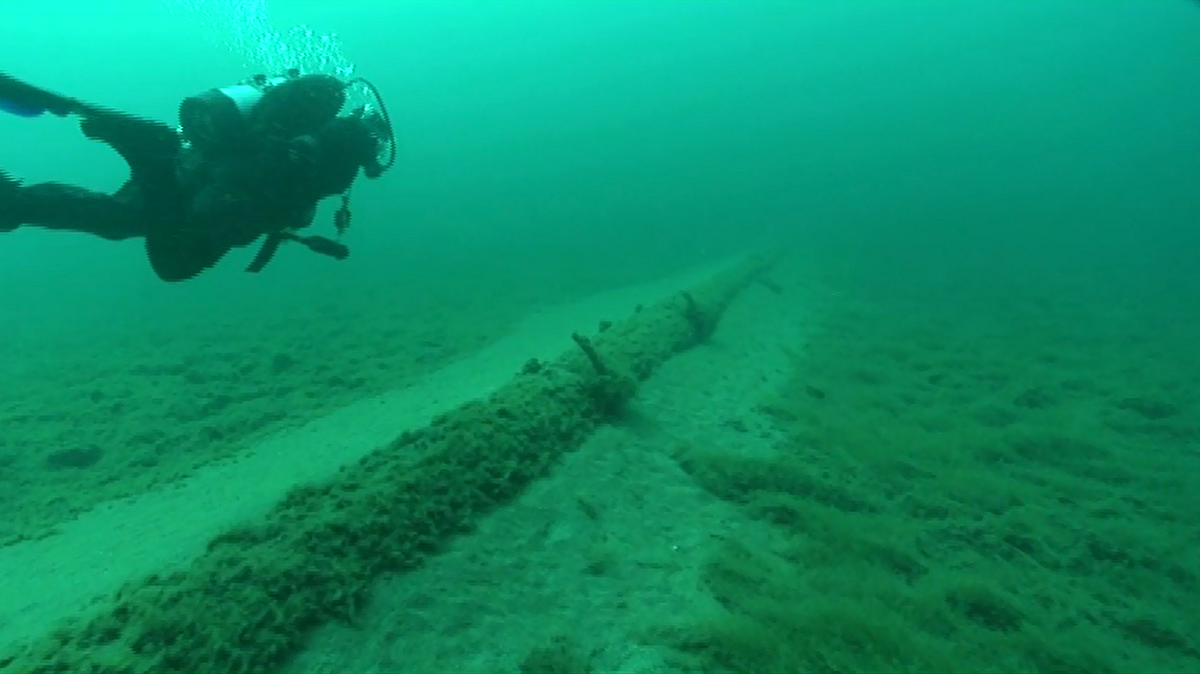This coverage is made possible through a partnership with Grist and Interlochen Public Radio in Northern Michigan.
Those involved in the Line 5 pipeline controversy have been waiting for the United States Department of Justice — and the Biden administration — to come forward with its opinion on a case that involves tribal sovereignty and foreign relations.
But when the legal brief came down on Wednesday, no one was satisfied.
The Justice Department amicus brief backed claims from a Wisconsin tribe that Enbridge, a Canadian company, was trespassing on its lands by continuing to operate the Line 5 pipeline there. The 71-year-old pipeline carries up to 540,000 barrels of oil and natural gas liquids daily from Superior, Wisconsin, to Sarnia, Ontario.
The DOJ also agreed that Enbridge has been trespassing on the band’s lands for over a decade, and specified the company should pay more than the court-ordered $5.15 million to the band, since the company has made over $1 billion in that time.
“We are grateful the U.S. urged the court not to let Enbridge profit from its unlawful trespass,” said Robert Blanchard, chairman of the Bad River Band of the Lake Superior Chippewa Indians, located in northern Wisconsin.
But, Blanchard added in a statement, they’re disappointed the U.S. didn’t call for the company to stop trespassing immediately: “Enbridge should be required to promptly leave our Reservation, just like other companies that have trespassed on tribal land.”
The legal trail began in 2019, when the band sued Enbridge for trespassing. The district ruling came out last June. Both Enbridge and the band appealed.
In their appeal, Enbridge and the Canadian government pointed to the 1977 Transit Pipeline Treaty between the United States and Canada, which promised an uninterrupted flow of oil and gas products between the nations.
Both Enbridge and Canada argue that shutting down the pipeline before relocating it would violate the pipeline treaty, and would impact energy supplies across the northern U.S. and Canada.
The court waiting for the DOJ brief, the Seventh Circuit Court of Appeals, was looking for guidance on that question.
But the department stopped short of saying how the court should interpret the 1977 treaty, only recommending that the case be sent back to the district court to more fully consider public interests, including diplomatic relations with Canada, energy concerns around Line 5, and protecting the band’s sovereign rights.
“The brief does not provide an interpretation of the transit treaty’s provisions, and that was pretty stunning, given that the court asked specifically for that interpretation,” said the band’s attorney, Riyaz Kanji.
The Bad River Band disagrees with Enbridge and Canada’s interpretation of the pipeline treaty. The band refers to its 1854 treaty with the U.S., which recognizes its sovereign authority over those lands.
Even if the pipeline treaty applies, according to the band, it still allows for pipelines to be regulated, including for pipeline safety and environmental protection.
That has worried the band’s supporters. Some say the U.S. is failing to meaningfully support tribal sovereignty, instead protecting its interests with Canada.
“From the point of view of the tribe and its allies, this is incredibly concerning that the United States is not advocating for the shutdown or removal of that pipeline” said Matthew Fletcher, a citizen of the Grand Traverse Band of Ottawa and Chippewa Indians and a law professor at the University of Michigan.
Other Great Lakes tribes have argued that accepting Canada and Enbridge’s interpretation of the pipeline treaty would undermine foundational principles of tribal sovereignty and would have major implications for property rights.
In a letter to the Biden administration in late February, representatives from 30 tribal nations across the region said the U.S. should fulfill its trust responsibility by rejecting that interpretation of the pipeline treaty.
Enbridge declined Grist’s request for an interview. In an emailed statement, company spokesperson Ryan Duffy said, “The Government of Canada has made its position clear. Such a shutdown is not in the public interest as it would negatively impact businesses, communities and millions of individuals who depend on Line 5 for energy in both the U.S. and Canada.”
The band, Enbridge, and Canada have until April 24 to respond to the DOJ’s brief. The Seventh Circuit Court of Appeals will then decide how to move forward.
Editor’s note: Enbridge is an advertiser with Interlochen Public Radio. Advertisers have no role in IPR’s editorial decisions.








